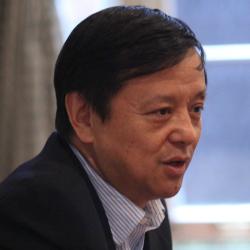Charles Li '91 Speaks to Students About Chinese Capital Markets
Li, Chief Executive Officer for Hong Kong Exchanges and Clearing, Says China's Next Task is to Invest Abroad Some of the Wealth It Has Acquired
| Charles Li '91 |
New York, March 14, 2013—As one of the largest financial centers in the world, Hong Kong serves as a connecting point for China and Western nations, Hong Kong Exchanges and Clearing Chief Executive Officer Charles Li ’91 told students and faculty at a recent event sponsored by the Center for Chinese Legal Studies and the Society for Chinese Law.
“Hong Kong is part of China, so China feels comfortable trying to open itself up through Hong Kong,” Li said. “Because Hong Kong is an open society with the rule of law, foreign investors feel comfortable as well. Hong Kong uniquely serves this massive interaction of East meeting West.”
But China will have to open itself up even further to export some of the massive wealth it has acquired in the last few decades, Li went on. International trade, foreign direct investment, and reform of the capital markets transformed China from “a super power in population and area to a real international economic super power,” he said.
Li spoke to students about a wide range of economic topics and also about his career path, which began when he worked as an offshore oil driller in China as a teenager and included a stint in journalism in Alabama. While a student in law school, Li considered dropping out during his first year because he felt ill-prepared for the rigorous academic environment compared to other students, he said. But he persevered, and even “became a small hero” to his classmates.
“I’d raise my hand and say, ‘Professor So-and-So, I have no clue what you’re talking about,” he joked. Apparently Li was not the only one who needed help—his classmates gave him a round of applause.
After he graduated from Columbia Law School, Li worked for Davis Polk & Wardwell and then Brown & Wood before being recruited by Merrill Lynch where he eventually headed that firm’s China business. He later worked at JP Morgan China before joining Hong Kong Exchanges and Clearing, one of the largest stock exchanges in the world.
Li said the road ahead would be difficult for China as it integrates further with other world leaders, including the United States. The two countries are culturally very different—like distinct houses on opposite sides of a river, he said.
“Democracy doesn’t just come out of the sky,” Li said. “It’s not like the Chinese people or the Chinese government don’t like the U.S. house. But they don’t live there. The Chinese have to start from their own house to make the change.”
